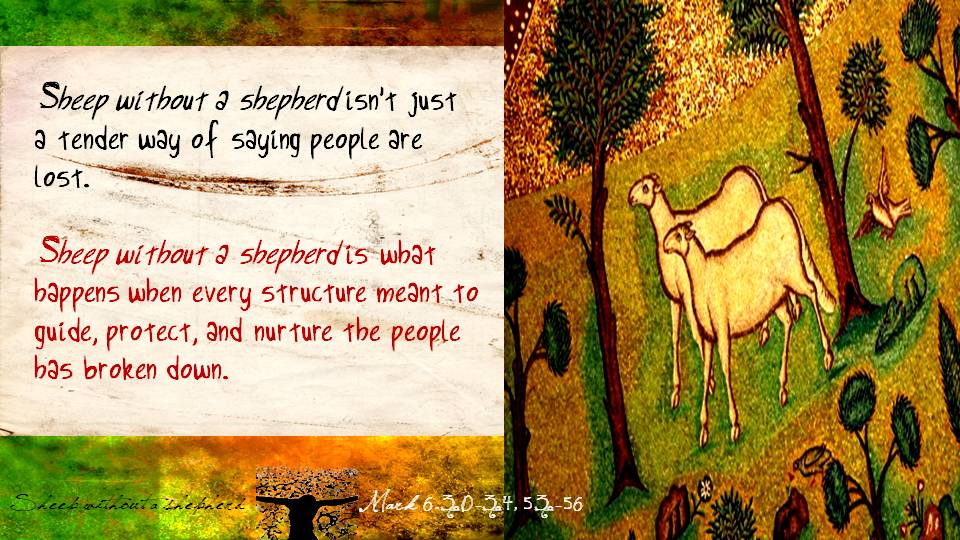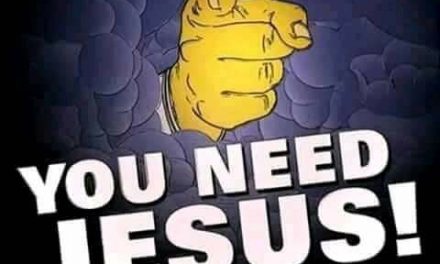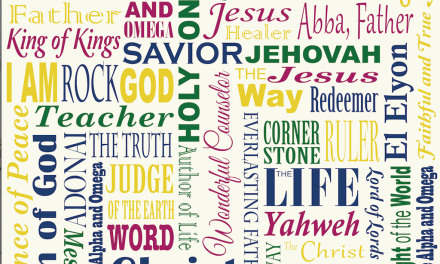Like sheep, we have all gone astray. We have turned each to our own way – Is 53:6.
The Bible is God’s prescription for the health of our soul and a window through which we catch a glimpse of the heart of Jesus. The Gospel of Mark portrays Jesus Christ, the Servant of God. John, whose surname was Mark, the writer of the Gospel of Mark tells clearly certain facts about Jesus, His deeds more especially than His words. Mark shows what Jesus accomplished during His brief ministry on this earth, how His coming is still changing the world. In today’s Mark Gospel, we read about Jesus’ compassion for the multitude in the desert – “… saw the vast crowd, his heart was moved with pity for them, for they were like sheep without a shepherd; and he began to teach them many things.” The motif of the people of Israel in the desert after escape from Egypt resonates with the malnourished spiritual state of the church and our nation today especially after the experiences of past national revivals. The church and our nations are in the condition and spiritual state of isolation, loneliness, fear, and famine – dual hungers of the soul and body. We are in such a time of lack of shepherding, a time of isolation, loneliness, and individualism when it is increasingly becoming difficult to identify neighbours in a police line-up or in a shopping mall.
Today, the people are clamouring for their own way from the leadership just as the people of Israel clamoured for their own way from Moses. Moses in this context suggests a symbol of a spiritual leadership, a shepherd. There are some parallel between Moses and Jesus. On scriptural types, John Hardon said, “A Biblical person, thing, action, or events that foreshadows new truth, new actions, or new events … A likeness must exist between the type and the archetype …” Moses a Jew was born when Egyptians (gentiles) ruled the people of Israel; Jesus a Jew was born when Romans (gentiles) ruled the people of Israel (Exd 1:8-10, Lk. 2:1-5). Pharaoh, an evil ruler, decreed that all male Hebrew babies should be killed by casting them into the river; Herod, an evil ruler, decreed that all male Hebrew babies should be put to death (Exd 1:23, Mt. 2:16). Moses was hidden in Egypt 3 months to keep him alive; Jesus was also hidden in Egypt to keep him alive (Ex 2:2, Mt. 2:13). Moses’ mother put him in the river in a BASKET; Jesus’ mother put him in a MANGER (feeding trough) (Ex 2:3, Lk. 2:7). Moses means drawn out of water (Ex2:10). Drawing out of water is a picture of salvation. Moses was Israel’s way of salvation. Jesus’ name in Hebrew is Yeshua which means salvation (Is 12:3). Jesus, the New Moses means salvation and every scene of our sorrow not only touches Him, His heart always moves at the sight of human distress or want.
The world is becoming a ‘Multitude in the desert’ of sorrow, affliction, immorality, unbelief and pride – a generation of sheep living in their own way. The ‘Multitude in the desert,’ the ‘crowd around the threatened Jesus is a metaphor for the Church,’ and our world today living in their own way. We are in a post-truth culture where we see people who are dying to be fed physically and spiritually, and the Church under death threat and decline. The kind of trouble that stirred the compassion of Jesus 2000 years ago remains the same with our generation today. Jesus saw the people as sheep not having a shepherd. The reflection is that, ‘it was not their hunger, nor their poverty, nor their sickness, but their spiritual need that so deeply touched His compassion.’ For Jesus as a model of true shepherd, ‘there were no wise, gentle, thoughtful pastors watching over the higher interests of their immortal natures, feeding them with heavenly bread, protecting them from the wolves of sin and lust, and leading them in right paths.’ Social action is different from spiritual need. We can be a charity organisation without being a church but we cannot be a true church without charity. ‘Multitude in the desert’ reminds us that no condition (poor or rich) is as sad as that of spiritual neglect. The ‘soul peril is far more pitiable than bodily danger and distress,’ hence Jesus first ‘began teach them many things (Mark 6:34). ‘Multitude in the desert’ beyond the large number of people without adequate food summons us not to miss the feeding of the souls that Jesus engaged in as he “taught them many things.” In relation to the dual hungers of the body and the soul, ‘Multitude in the desert’ raises the awareness of the multitudes who hunger in their souls for meaning and peace. There are some questions that expresses the hunger of our souls, namely: “Why am I here?” What should I do with my life?” After life, what will become of me – Heaven or Hell?”
The story of the rich man and Lazarus shows that those who suffers bodily hunger are those with little money and those with money suffers the most from the soul’s hunger. The Christian faith is declining today for lack of teaching and shepherding in the desert of our world despite our wealth, “none to lead and guide them in the right way, none to feed them with good doctrine.” The Church first and foremost guidance is in truth by the Son of God. The lesson is not about lack of shepherding. The shepherd does not alone have a responsibility, the sheep, ‘have a responsibility to accept and follow right leadership,’ as true of our relationship to the greatest Shepherd of all – Jesus Christ. ‘Multitude in the desert’ of global corruption, family breakdown, divisions, walls building, and Brexit calls today’s shepherd to develop “the mind of Christ,” on the teaching and moving for souls exposed to the world’s enmities, wandering from the fold amid sin’s pitfalls and uncared for. Multitude in the desert invites us to stop and overcome ‘man-made tradition over the life-giving food of the Word of God.’The increasing multitude of the malnourished and lost sheep – the poor and the rich experiencing bodily and soul hunger calls for the need to pray the prayer of Moses asking God: May the Lord the God of the spirits of all flesh provide a man, that may be over this multitude: And may go out and in before them, and may lead them out, or bring them in: lest the people of the Lord be as sheep without a shepherd (Num 27:17-18).











Recent Comments